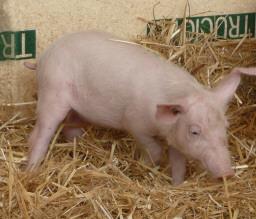Italian scientists have created the world's first pigs to be born without the antigen that causes humans to reject transplanted animal organs, Cremona's Animal Reproduction Technology Laboratory said on Thursday.
The two pigs, who have been named Apollo and Circe, were cloned in Italy from cells that came from the Massachusetts General Hospital in Boston as part of a European project to increase the likelihood of successful animal-to-human transplants.
Apollo and Circe are the first pigs whose genetic makeup will prevent hyperacute rejection of organs by the human immune system - an event that tends to happen immediately after a transplant.
While normal pigs weigh in at around 200-300 kg, Apollo and Circe are much smaller, at 90 kg each.
''Apollo and Circe are pigs of small dimensions because they come from a line of genetically modified pigs from the United States,'' said laboratory director and animal-cloning pioneer Cesare Falli.
''Pigs of this sort are not very prolific, but they have the advantage of being genetically very similar such that they can be considered a sort of 'universal donor','' he said.
The ultimate aim of the 10-million-euro Xenome project, which involves 21 different laboratories across Europe, is to create mini-pigs with around ten new genes.
''Modifying this antigen is the first step, but on its own it's not enough,'' Falli explained.
The Cremona lab - which produced the world's first cloned horse and bull - is currently awaiting the births of other genetically modified pigs into which genes controlling coagulation and infection have been introduced.
At Milan's Bicocca University, another group of scientists working within the project has taken a different approach to the problem and has added a gene to the pigs' make-up that can block the activation of the human immune system.
The group is waiting for the first pigs to be born.
Laboratory chief Marialuisa Lavitrano said the group was also working to add genes that will prevent inflamation as well as stress-activated protective genes.
The group has also discovered a means of transferring new genes inside sperm, she said.









